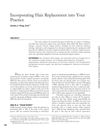 3 citations,
November 2008 in “Facial Plastic Surgery”
3 citations,
November 2008 in “Facial Plastic Surgery” Adding hair restoration to a cosmetic surgery practice requires a skilled team and specialized equipment.
 3 citations,
June 2004 in “Alternative and Complementary Therapies”
3 citations,
June 2004 in “Alternative and Complementary Therapies” The document concludes that hair loss is influenced by genetics and other factors, and while treatments like finasteride can help, they have limitations and side effects.
[object Object]  2 citations,
January 2017 in “Journal of Pigmentary Disorders”
2 citations,
January 2017 in “Journal of Pigmentary Disorders” Genetics, stress, and health issues can cause early hair greying, which affects self-esteem, and there's no cure, only hair dye.
 2 citations,
September 2007
2 citations,
September 2007 Surgical hair restoration involves moving hair from a non-balding area to a balding area, with the transplanted hair not subject to male pattern baldness. Medications can slow hair loss and regrow some hair, but successful treatment needs careful planning, skill, and ethical responsibility due to progressive hair loss and limited donor hair.
 2 citations,
May 2001 in “Current problems in dermatology”
2 citations,
May 2001 in “Current problems in dermatology” The conclusion is that effectively treating hair disorders is difficult due to the complex factors affecting hair growth and more research is needed to improve treatments.
 1 citations,
July 2018 in “Elsevier eBooks”
1 citations,
July 2018 in “Elsevier eBooks” Avoid chemical and physical damage to protect hair.

Hair transplants are effective for male and female pattern baldness, have evolved in technique, and require careful planning for natural results and managing complications.
 1 citations,
July 2015 in “The European research journal”
1 citations,
July 2015 in “The European research journal” Stopping aripiprazole can reverse its side effect of hair loss.
 1 citations,
December 2011
1 citations,
December 2011 Marine-derived ingredients show potential for hair health but need more human trials to confirm effectiveness.
 1 citations,
November 2011 in “Dermatologica Sinica”
1 citations,
November 2011 in “Dermatologica Sinica” Women using hair relaxers with alopecia had lower zinc levels, suggesting zinc deficiency might contribute to hair loss.
 October 2024 in “Current Trends in Biotechnology and Pharmacy”
October 2024 in “Current Trends in Biotechnology and Pharmacy” The shampoo effectively promotes hair growth and is halal-compliant.
 May 2024 in “International Journal For Multidisciplinary Research”
May 2024 in “International Journal For Multidisciplinary Research” The herbal hair cream helps protect and improve hair health.
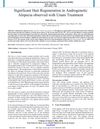 May 2024 in “International journal of science and research”
May 2024 in “International journal of science and research” Unani treatment significantly regrows hair in young adults with androgenetic alopecia.
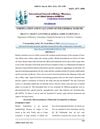 February 2024 in “International journal of biology, pharmacy and allied sciences”
February 2024 in “International journal of biology, pharmacy and allied sciences” The polyherbal hair oil effectively treats various hair problems and promotes hair health.
 January 2024 in “International journal of homoeopathic sciences”
January 2024 in “International journal of homoeopathic sciences” Homeopathic treatments can effectively manage hair loss and improve well-being.
 September 2023 in “Journal of movement disorders”
September 2023 in “Journal of movement disorders” Dopaminergic therapy in Parkinson's disease patients is linked to increased hair loss.
 June 2022 in “Al-Azhar International Medical Journal /Al-Azhar International Medical Journal”
June 2022 in “Al-Azhar International Medical Journal /Al-Azhar International Medical Journal” Adding nano fat to hair transplants improves results for scar-related hair loss.
 January 2021 in “Journal of cosmetology & trichology”
January 2021 in “Journal of cosmetology & trichology” Ageratum conyzoides L. extract may effectively and safely treat hair loss.
 December 2020 in “Èffektivnaâ farmakoterapiâ”
December 2020 in “Èffektivnaâ farmakoterapiâ” Selenzin Peptide Active can effectively treat hair loss in postmenopausal women.
 August 2020 in “The American Journal of Cosmetic Surgery”
August 2020 in “The American Journal of Cosmetic Surgery” Hair transplant surgery significantly reduces anxiety in balding patients, especially those under 30 years old.
 129 citations,
October 2000 in “British Journal of Dermatology”
129 citations,
October 2000 in “British Journal of Dermatology” Finasteride helps increase hair growth in men with hair loss.
 73 citations,
November 2005 in “Journal of Investigative Dermatology Symposium Proceedings”
73 citations,
November 2005 in “Journal of Investigative Dermatology Symposium Proceedings” Some women with common hair loss may develop permanent hair loss.
[object Object]  35 citations,
February 2012 in “Journal of The American Academy of Dermatology”
35 citations,
February 2012 in “Journal of The American Academy of Dermatology” Finasteride significantly improves hair growth but may cause sexual side effects.
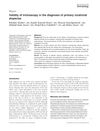 34 citations,
April 2016 in “International Journal of Dermatology”
34 citations,
April 2016 in “International Journal of Dermatology” Trichoscopy is a useful method for identifying primary cicatricial alopecias and their specific types.
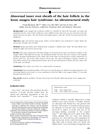 31 citations,
December 2010 in “Journal of the American Academy of Dermatology”
31 citations,
December 2010 in “Journal of the American Academy of Dermatology” Loose anagen hair syndrome is caused by structural abnormalities in the hair follicle's inner root sheath.
 14 citations,
May 2011 in “Facial Plastic Surgery Clinics of North America”
14 citations,
May 2011 in “Facial Plastic Surgery Clinics of North America” Laser hair removal is effective for dark hair but needs improvement for nonpigmented or fine hairs.
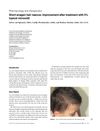 8 citations,
July 2007 in “International Journal of Dermatology”
8 citations,
July 2007 in “International Journal of Dermatology” Using 5% topical minoxidil improved and normalized the hair growth in a girl with short anagen hair naevus.
 1 citations,
December 2018 in “Journal of Cosmetic Dermatology”
1 citations,
December 2018 in “Journal of Cosmetic Dermatology” Men with thinner hair from genetic hair loss may be more likely to have an enlarged prostate.
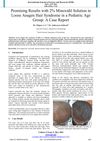 May 2023 in “International journal of science and research”
May 2023 in “International journal of science and research” 2% minoxidil solution improved hair density and quality in children with Loose Anagen Hair Syndrome.
 87 citations,
March 2011 in “Australasian Journal of Dermatology”
87 citations,
March 2011 in “Australasian Journal of Dermatology” Genetics and hormones play a role in male and female hair loss, but more research is needed to fully understand it.






























